
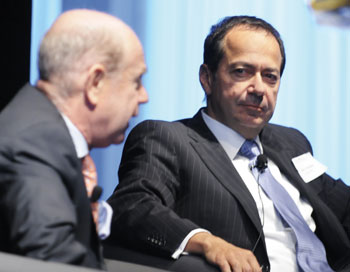
Edward Altman (left) interviewed John Paulson about his firm’s recent success in short-selling subprime credit. |
Winning in a Losing Market: A Chat with Financier John Paulson
NYU Stern alumnus John Paulson (BS ’78), the founder and president of Paulson & Co., a leading hedge fund firm, spoke in September to an audience of more than 400 Stern students and alumni during a Chats with Financiers event. The Chats with Financiers Series brings together academics and luminaries in the finance industry for discussions on personal experiences and current trends in finance.
Edward Altman, Max L. Heine Professor of Finance, interviewed Paulson about his firm’s recent heralded success in short-selling subprime credit. Paulson said that his investment strategies are two-fold: event-driven arbitrage and distressed and bankruptcy investing. Reacting to the US Securities and Exchange Commission’s recent, temporary ban on the short-selling of 87 specific stocks, Paulson said that while he shared regulators’ concerns about naked short-selling, he wouldn’t blame short-selling for the market’s decline. He argued that only 4 percent of the market’s outstanding shares are short and that most of the companies complaining about short-selling are about to fail. He said hedge funds exist because they can show positive returns in all markets, adding that short-selling can produce positive returns in declining markets. Paulson Funds were among the highest-performing funds in 2007 and were awarded the Arbitrage Fund of the Year, Best New Fund of the Year, and Management Firm of the Year by Absolute Return magazine.
The conversation continued following the event, as Paulson joined more than 35 invited NYU Stern alumni at the Union Square W Hotel for an After Market Hours event, one of a series hosted by NYU Stern’s Dean’s Executive Board that showcases successful alumni and their diverse and creative careers. There he predicted that the financial crisis would spread to Main Street in 2009 and noted that European markets, which tend to lag the US by approximately six months, wouldn’t be far behind. “We’re in the sixth inning of a double header,” he said.
The Future of Intellectual Diversity: A 90th Birthday Gala for Dean Emeritus Abraham Gitlow
“Today, when you tell someone you’re from Stern, there is a nod of recognition, a slight lifting of the eyebrows – you get respect,” said Professor and Dean Emeritus Abraham Gitlow at his birthday celebration in October.
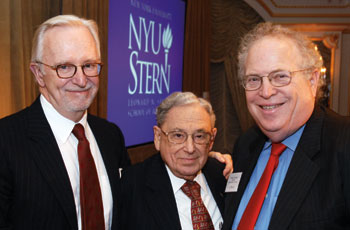
Abe Gitlow (center) celebrates his 90th birthday with Dean Thomas F. Cooley (left) and William Berkley at the annual Board of Overseers dinner. |
It isn’t often that the Stern community has the opportunity to celebrate the 90th birthday of an esteemed member of its faculty – and the School chose the annual Board of Overseers dinner as the occasion to do so. More than 150 members of the Board of Overseers and Dean’s Executive Board, as well as alumni, faculty, friends, and administrators, gathered at the St. Regis Hotel in New York City to pay homage to Gitlow’s heritage of lifelong education. The evening featured keynote remarks on the future of intellectual diversity by Vijay Vaitheeswaran, award-winning correspondent for The Economist and executive-in-residence at NYU Stern. The energy in the room conveyed how meaningful Professor Gitlow’s leadership, teaching, and research have been to his students and the extent of his impact on the Stern community.
Dean Thomas F. Cooley welcomed guests, acknowledging the presence of former Deans Frederic Choi, Daniel Diamond, and William Dill. “Every dean should be so lucky to have such distinguished predecessors,” said Dean Cooley. “Abe Gitlow’s life and work at Stern has been as steady and constant as the stock market has been volatile – it is nice to have points of constancy in times like these.”
William R. Berkley (BS ’66), chairman of the Board of Overseers, noted that Gitlow always demanded “more than the given standards,” and that thanks in part to his persistence and implementation, Stern is now positioned at the forefront of global business education. Vaitheeswaran observed that intellectual capital consists of innovation, the catalyst for change and diversity in thought. “Every human being has the capacity to become an innovator through education and empowerment,” he said.
Gitlow joined the faculty of the School of Commerce, Accounts, and Finance, as Stern’s Undergraduate College was then known, in 1947. He served as Dean of NYU Stern from 1965 to 1985, playing a significant role in the School’s rapid evolution from a local school of opportunity to an internationally renowned institution.
Gitlow spoke fondly of his 60 years at the School, lauding the success of Stern’s gifted faculty in teaching, preparing, and training the generations of Stern students who now comprise its distinguished alumni network. The School, he said, needs support now more than ever: “In my nine decades, I have learned this – giving is good. It comes back, even multiplied, years later, and validates a life well spent.”
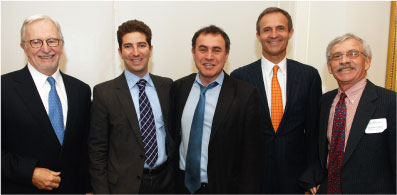 |
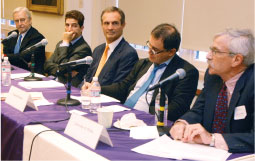 |
 |
| Top: (from left to right) Dean Thomas F. Cooley, Dennis Berman, Nouriel Roubini, Mark Patterson, and Lawrence White analyzed and offered solutions for the financial crisis. |
|
What the Future Holds: Experts Hold Forth at Market Pulse Event
As the Dow hit record lows, consumer confidence continued to wane, and the Fed crafted plans to stave off a Depression-like era, Dean Thomas F. Cooley moderated a discussion in October with industry, media, and academic thought leaders to analyze and offer solutions for the current financial crisis. The event was part of NYU Stern’s Market Pulse Series, introduced in fall 2007 by Dean Cooley to tackle pressing global issues affecting business and society.
The panel included Dennis Berman, The Wall Street Journal deputy bureau chief for money and investing; Mark Patterson (MBA ’86), chairman and co-founder of MatlinPatterson Global Advisors LLC; Nouriel Roubini, Stern professor of economics and international business; and Professor Lawrence White, deputy chair of Stern’s economics department and former member of the Federal Loan Home Bank Board.
With the 23 percent job loss experienced during the Great Depression as a reference point, Dean Cooley said we are a long way from that point. To reinstill confidence in the markets, he stated, the government would need to establish the level of predictability and consistency that Alexander Hamilton prescribed.
Berman said presciently that the infusion of capital into the market would not cover the auto industry, adding that banks and the economy have not begun to process what will happen with credit card debt and auto lending. He suggested that Wall Streeters are out of touch, and along with Washington insiders, exist in a bubble.
According to Patterson, with the Fed’s bailout, all taxpayers are now distressed investors. Patterson argued that the government has been negligent on regulation – “asleep at the switch” – and that the government and banks have moved from “100 percent gullibility” to asking questions, but still not acting. He also expressed concern with the FDIC, which had just $43 billion to cover $4.5 trillion in insured funds, as well as the unregulated market for credit default swaps.
Nicknamed “Dr. Doom” for the nature of his economic forecasts, Roubini opined that the US is in its worst financial crisis since the Great Depression and that the country was entering a prolonged recession that could last about 24 months.
According to White, “It’s all about leverage.” When the technology bubble burst and stock market value decreased by $7.5 trillion between December 1999 and 2002, the financial sector handled it, he pointed out. The losses were absorbed, mainly by households, in non-leveraged forms such as mutual funds, pension funds, and 401Ks. Today, the $4 trillion to $6 trillion loss in housing value will again be absorbed mostly by households, but because mortgages are so highly leveraged, there will be spillover into the financial sector, which, because of high leverage levels, cannot absorb it all. Expect prolonged impact on future consumer spending patterns, retirement, and overall consumption, White predicted.
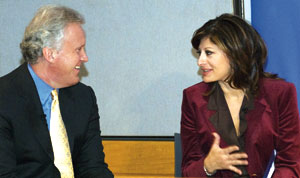
At an event broadcast live to six other business schools, Jeff Immelt was interviewed by Maria Bartiromo about how GE is navigating the credit markets, new technology, and globalization. |
GE Chairman and CEO Jeff Immelt Discusses The Shrinking Economy with CNBC Anchor
Maria Bartiromo
“I’ve already seen 20 things I never thought I’d see in a lifetime, and I’ve already done 10 things I never thought I’d have to do. And I’ve got the next 10 lined up,” said Jeff Immelt, General Electric chairman and CEO, in regard to the current financial turmoil. At NYU Stern in October for a GE Live event entitled, “Winning in Today’s Environment,” Immelt spoke to nearly 300 Stern MBA students, as well as hundreds more at six other business schools across the globe – London Business School, IESE in Spain, UVA-Darden, Thunderbird, UNC, and Emory – where the event was broadcast live. Immelt was interviewed by NYU alumna and Trustee Maria Bartiromo, host and managing editor of CNBC’s “The Wall Street Journal Report with Maria Bartiromo,” as well as anchor of “Closing Bell with Maria Bartiromo.”
Immelt described how GE is navigating the credit markets, investing in technology and alternative energy sources, and managing globalization. He said GE’s continued financing of its infrastructure divisions will keep the company growing. “Government is going to want to see business solve some big problems out there,” he stated. “And some of the big problems are infrastructure problems. It’s healthcare, it’s energy, it’s infrastructure. So the financing of these, and the technology that goes with them, is going to be one of the growth areas of the future.”
The GE Live event was preceded by a breakfast where students had the opportunity to meet with NYU Stern alumni now working at GE as well as other GE executives and recruiters.
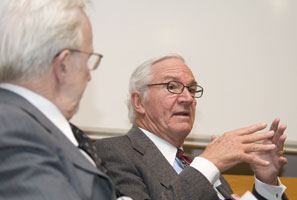
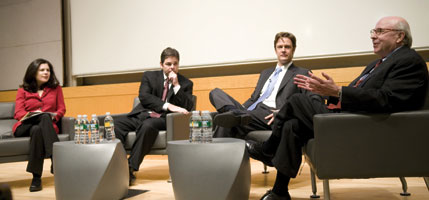
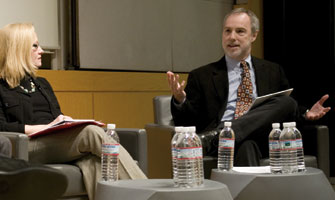
Top: Roy Smith (right) and Dean Thomas F. Cooley discussed solutions for fixing global finance.
Middle: (from left to right) Alexandra Starr, Michael Moran, Lane Greene, and Richard Sylla addressed the future of American leadership.
Above: Anna Szterenfeld and David Backus debated US trade policy.
|
Advising Obama: Stern Series Focuses on the New Administration
As President-elect Obama transitioned into the White House, experts from the Council on Foreign Relations, The Economist, and NYU Stern debated the current global financial crisis with a focus on ways to repair a broken economy. Entitled “Transition 2008: Advising America’s Next President,” the series of three events addressed global issues as they relate to the US presidency.
The first event’s panel on fixing global finance included Greg Ip, US economics editor at The Economist; Brad Setser, fellow for geoeconomics at the Council on Foreign Relations; and Roy Smith, Kenneth Langone Professor of Entrepreneurship and Finance at NYU Stern. The discussion was moderated by Thomas F. Cooley, Dean of NYU Stern and a macroeconomist.
In the short term, Ip said, it is important to create a formal legal authority by which the government can take over any company of systemic importance that is in financial trouble and pay off creditors and wind the company down. In the long term, he suggested a stricter form of regulation, one that limits the risks that bank holding companies can take.
According to Setser, “Taxpayers have not realized that they are on the hook on the downside.” He noted that the G7’s commitment that no systemically important institution will fail puts taxpayers on the hook to bail them out. In his view, even with no taxpayer money on the line, banks should evaluate their capital before considering paying dividends. Regulators should be evaluating whether their equity capital could be better used to protect the taxpayer.
Smith advised Obama to heal the real economy by cutting the budget so he can spend what’s needed to get things going; to intervene in the markets to get them flowing again; and not to bail out General Motors. “Let GM go bankrupt,” he said.
Noting that the current regulatory system appears to have been suspended, Dean Cooley stressed the need to establish the rules of the game so that market players can know what to expect moving forward. He said it was important to include additional pieces in the regulatory architecture and to devise better ways for firms to calculate risk.
The second event of the series addressed how Obama’s election may change the way America leads, how the world views the US, and whether American dominance is over. Panelists were Michael Moran, executive editor of CFR.org; Lane Greene, international correspondent for the The Economist; and Richard Sylla, Henry Kaufman Professor of the History of Financial Institutions and Markets and professor of economics at Stern. The panel was moderated by Alexandra Starr, writer for Slate magazine and former political correspondent for BusinessWeek.
Moran predicted that the US will not be “walking the walk” in terms of economics over the next two years, and that there will be more “propping up” of industries and market interventions – the very actions the US condemned the French for doing post-WWII. While the economic crisis is global, Greene said the US has been targeted for blame, specifically capitalism and American economic ideas on how to organize economies. This perception could lead to protectionism on the part of other countries and is likely to affect how the US talks about economic policy.
According to Sylla, “We’re moving back toward a pre-1914 world.” He added that the US will continue to lead because there isn’t a willing substitute. To be a good leader, he noted, the US should involve other countries in the discussion.
The third event focused on trade policy. Panelists included Edward Alden, Bernard L. Schwartz Senior Fellow at the Council on Foreign Relations; Anna Szterenfeld, Latin America editor, Economist Intelligence Unit; and David Backus, Heinz Riehl Professor and chair of the department of economics at Stern. The moderator was Jonathan Eaton, professor of economics at NYU.
Alden advised a serious rethinking of the direction of US trade policy and a strategic pause on the issue. For 20 years, he noted, trade policy has focused on openness, but a new direction might be in order, particularly since there is a lack of support for the current US trade agenda. Second, he said that during the “timeout” the US should “do no harm,” such as slapping tariffs on Chinese imports because of the value of the yuan. Finally, the US should refocus trade policy on the World Trade Organization, which he considers underused, versus negotiating bilateral agreements, which he believes are politically controversial and less economically efficient.
Focusing on US-Latin America trade relations, Szterenfeld said trade policy must be formed in the context of a comprehensive agenda that includes other issues such as energy, poverty reduction, and debt relief. She argued that the trade embargo against Cuba should be dismantled, and advised that the US engage and partner with Brazil, a powerhouse economy in the Western Hemisphere and an important global player.
Backus said he was unsure if he’d urge Obama to make trade policy a primary issue. He explained that increased trade hasn’t produced huge gains, and that his biggest fear would be stepping backwards with trade policy, especially in light of the current economic climate.
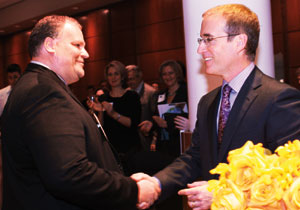
Stewart Satter (right) presented Darrell Hammond with the Satter Social Entrepreneur of the Year Award. |
Measuring Impact: Social Entrepreneurs Discuss the Challenges
More than 150 entrepreneurs, investors, philanthropists, and academics gathered in November for the Fifth Annual NYU Stern Satter Conference of Social Entrepreneurs. “As the field of social entrepreneurship matures, measuring impact remains a significant challenge for most organizations,” said NYU Stern Clinical Professor Jill Kickul, the conference organizer and director of the Stewart Satter Program in Social Entrepreneurship in Stern’s Berkley Center for Entrepreneurial Studies.
Plenary keynote speaker Mark Kramer, founder and director of FSG Social Impact Advisors, said that the failure of classical philanthropy can be attributed to the inaccurate perception that problems can only be solved through the nonprofit sector and the narrow philanthropist mindset on how to achieve social change. He cited evaluation and social entrepreneurship as the two keys to unlocking the future of the nonprofit sector.
According to Jason Saul, founder and president of Mission Measurement LLC, the sector is increasingly becoming a ‘social capital market’ in which organizations need to be focused on the outcomes they produce and the measurement that enables them to improve their impact.
Stewart Satter (MBA ’82), benefactor of Stern’s social enterprise program and member of Stern’s Board of Overseers, presented the NYU Stern Satter Social Entrepreneur of the Year Award to Darell Hammond, founder and CEO of KaBOOM! For the past 12 years, Hammond’s organization has used an innovative model to join business and local neighborhoods in an effort to construct more than 1,500 new playgrounds, skate parks, sports fields, and ice rinks across North America.
Stern Professor and Academic Director of the Berkley Center William Baumol awarded the 2008 NYU Stern Social Entrepreneur Lifetime Achievement Award to Bill Drayton, founder and CEO of Ashoka, a global association of the world’s leading social entrepreneurs dedicated to advancing the field of social entrepreneurship and the citizen sector.

(From left to right) Brett Cole, Stephen Friedman, Martin Lipton, and Joseph Rice debated the future of M&A in the economic turmoil. |
Key Wall Street Players Debate the Future of Mergers and Acquisitions
Three leading figures in the mergers and acquisitions field gathered at an NYU Pollack Center for Law & Business event at the Law School in October to discuss the future of M&A in the post-credit-bubble world before an audience of law and Stern business students and alumni.
Stephen Friedman, retired chairman of Goldman Sachs and current chairman of the Federal Reserve Bank of New York and of global private equity firm Stone Point Capital; Martin Lipton, founding partner of the law firm Wachtell, Lipton, Rosen & Katz; and Joseph Rice III, founder and chairman of private equity firm Clayton Dubilier & Rice, served as panelists. The discussion was moderated by Brett Cole, a writer for The Economist and author of M&A Titans: The Pioneers Who Shaped Wall Street’s Mergers and Acquisitions Industry.
Reflecting on the current US economic turmoil, Rice named “human greed” as the cause and an abundance of capital as a catalyst. Friedman attributed the crisis, in part, to incentive structures that encouraged bad lending and faulty business practices. “People will play the way you pay them,” he said, including banks, consumers, and rating agencies in the circle of blame.
Lipton predicted the crisis will last between three to five years, describing the evolution of a new financial order dominated by large banks surrounded by many small boutiques. “Capital raising will be in the hands of the big universal banks,” he said. “They will have the capital and the networks to do it.” Panelists agreed that M&A activity would eventually pick up.
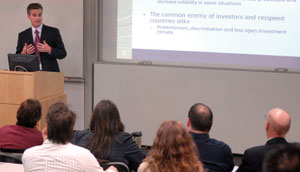
Thomas Ekeli spoke about his experience managing Norway’s $400 billion petroleum fund. |
Norwegian Finance Ministry’s Thomas Ekeli Delivers Fourth Annual Haitkin Lecture
At the Fourth Annual Haitkin Lecture, economist Thomas Ekeli, an investment director in the asset management department of the Norwegian Ministry of Finance, shared his experience managing Norway’s $400 billion petroleum fund. The fund is earmarked as the country’s pension fund and represents 10 percent of the $4 trillion global market for sovereign wealth funds. As the only major fund of its kind with an independent Council On Ethics, it is an international model of transparency and principled investing. According to Ekeli, the fund was established to manage Norway’s oil wealth wisely, now and for future generations. He noted that for many countries, great mineral wealth leads to corruption, political instability, and economic stagnation. He credits the fund’s success to its strategic investment philosophy and ethics: The fund only invests abroad, buys small stakes in multiple companies as a universal investor, disallows geopolitics as a driver of investment decisions, and chooses investments based on good corporate governance and human rights, while screening out certain companies that its Council On Ethics deems ethically incompatible with its purpose and goals.
The Haitkin Lecture on Business Ethics, established in 2004, is made possible through the generosity of Jeffrey M. Haitkin (BS ’68). The Lecture is dedicated to supporting the continuing discourse on significant emerging issues in business ethics, bringing a distinguished scholar to Stern annually to address timely national and global issues.
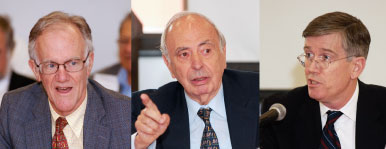
(From left to right) John Biggs, Seymour Jones, and Stephen Ryan explored the economic impact of fair value accounting practices on the weak US economy. |
Practitioners and Scholars Debate Mark-to-Market Accounting
Nearly 60 academics, professionals, and journalists gathered in October for an NYU Stern Ross Roundtable exploring the economic impact of fair value, or mark-to-market, accounting practices on the state of the US economy. Participants in the event, hosted by the Vincent C. Ross Institute of Accounting, represented the American Institute of Certified Public Accountants, Bloomberg, Columbia University, NYU, PricewaterhouseCoopers, and Standard & Poor’s, among others.
The debate was spirited and informative. Seymour Jones, clinical professor of accounting at Stern, questioned whether all the “disturbance” in today’s financial markets was caused by fair value accounting. Stern Professor Stephen Ryan, a proponent of fair value accounting practices, said, “The alternatives to fair value accounting are bad in illiquid markets and not good in liquid markets.” He pointed to several benefits of fair value accounting, including timeliness, its ability to self-correct, and its capacity to account consistently for matched positions. Addi-tionally, he contended that fair value accounting provides a good platform for both mandatory and voluntary disclosure.
Eli Bartov, Stern research professor of accounting, also supported fair value accounting, saying that the problems with implementation of FAS 157 are minimal and can be fixed. Professor James Ohlson, acting chair of Stern’s accounting department, pointed to a disadvantage of fair value accounting: “It’s very subjective, and it will oscillate with political environments.” Despite the continuing financial turmoil, Stern Executive-in-Residence John Biggs, former chairman of TIAA-CREF, warned against Congress’s setting accounting standards.


![]()